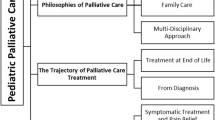Abstract
Despite the continuous improvement of pediatric palliative care, medical professionals still face various barriers regarding its implementation; our aim was to investigate this question in Hungarian pediatric oncology practice. Structured interviews were carried out in person with physicians from the Hungarian Pediatric Oncology Group (n = 22). Codes were generated inductively with the aid of Atlas.ti 6.0 software. Most physicians placed the palliative care discussion at the end of curative treatment (n = 21) and preferred to conduct it in a team setting (n = 18), mainly in the presence of a psychologist. Preparing parents for the child’s death can occur during the palliative care discussion (n = 3), in the child’s final days/h (n = 6), gradually (n = 10), or never (n = 3). There are words consciously utilized and avoided during this discussion, with the word “death” proving to be the most ambivalent (utilized n = 5, avoided n = 6).
Conclusions: There is no widely accepted unified practice among pediatric oncologists concerning the implementation of palliative care in Hungary. Despite the international recommendation, the common practice of timing is still at the end of curative treatment. Physicians rely on multidisciplinary teamwork, where the psychologist’s role is the most prominent in this discussion.
What is Known: • There is an international consensus that palliative care should commence at the diagnosis of a pediatric malignant disease regardless of illness outcome. • Barriers to the early implementation of palliative care in pediatric oncology involve resource-based and attitudinal factors. | |
What is New: • In Hungary, where pediatric oncologists are sole decision-makers, early implementation of palliative care is rare. • There is a strong preference among physicians for working within a team, while also asserting that presence of team members may decrease the level of intimacy. |





Similar content being viewed by others
Abbreviations
- Int.:
-
Interview
- PC:
-
Palliative care
References
American Academy of Pediatrics. Committee on Bioethics and Committee on Hospital Care (2000) Palliative care for children. Pediatrics 106:351–357
Bruera E, Hui D (2010) Integrating supportive and palliative care in the trajectory of cancer: establishing goals and models of care. J Clin Oncol 28:4013–4017. https://doi.org/10.1200/JCO.2010.29.5618
Centeno C, Lynch T, Garralda E, Carrasco JM, Guillen-Grima F, Clark D (2016) Coverage and development of specialist palliative care services across the World Health Organization European Region (2005–2012): results from a European Association for Palliative Care Task Force survey of 53 countries. Palliat Med 30:351–362. https://doi.org/10.1177/0269216315598671
Craig F, Abu-Saad Huijer H, Benini F, Kuttner L, Wood C, Feraris PC, Zernikow B (2008) IMPaCCT: standards of paediatric palliative care. Schmerz 22:401–408. https://doi.org/10.1007/s00482-008-0690-4
Dalberg T, Jacob-Files E, Carney PA, Meyrowitz J, Fromme EK, Thomas G (2013) Pediatric oncology providers’ perceptions of barriers and facilitators to early integration of pediatric palliative care. Pediatr Blood Cancer 60:1875–1881. https://doi.org/10.1002/pbc.24673
Fallowfield LJ, Jenkins VA, Beveridge HA (2002) Truth may hurt but deceit hurts more: communication in palliative care. Palliat Med 16:297–303. https://doi.org/10.1191/0269216302pm575oa
Golan H, Bielorai B, Grebler D, Izraeli S, Rechavi G, Toren A (2008) Integration of a palliative and terminal care center into a comprehensive pediatric oncology department. Pediatr Blood Cancer 50:949–955. https://doi.org/10.1002/pbc.21476
Hoell JI, Warfsmann J, Gagnon G, Trocan L, Balzer S, Oommen PT, Borkhardt A, Janssen G, Kuhlen M (2017) Palliative care for children with a yet undiagnosed syndrome. Eur J Pediatr 176:1319–1327. https://doi.org/10.1007/s00431-017-2991-z
Jackson VA, Jacobsen J, Greer JA, Pirl WF, Temel JS, Back AL (2013) The cultivation of prognostic awareness through the provision of early palliative care in the ambulatory setting: a communication guide. J Palliat Med 16:894–900. https://doi.org/10.1089/jpm.2012.0547
Johnston DL, Nagel K, Friedman DL, Meza JL, Hurwitz CA, Friebert S (2008) Availability and use of palliative care and end-of-life services for pediatric oncology patients. J Clin Oncol 26:4646–4650. https://doi.org/10.1200/JCO.2008.16.1562
Johnston DL, Vadeboncoeur C (2012) Palliative care consultation in pediatric oncology. Support Care Cancer 20:799–803. https://doi.org/10.1007/s00520-011-1152-6
Knapp C, Woodworth L, Wright M, Downing J, Drake R, Fowler-Kerry S, Hain R, Marston J (2011) Pediatric palliative care provision around the world: a systematic review. Pediatr Blood Cancer 57:361–368. https://doi.org/10.1002/pbc.23100
Kuhlen M, Holl JI, Sabir H, Borkhardt A, Janssen G (2016) Experiences in palliative home care of infants with life-limiting conditions. Eur J Pediatr 175:321–327. https://doi.org/10.1007/s00431-015-2637-y
Rodriguez-Galindo C, Friedrich P, Alcasabas P, Antillon F, Banavali S, Castillo L, Israels T, Jeha S, Harif M, Sullivan MJ, Quah TC, Patte C, Pui CH, Barr R, Gross T (2015) Toward the cure of all children with Cancer through collaborative efforts: pediatric oncology as a global challenge. J Clin Oncol 33:3065–3073. https://doi.org/10.1200/JCO.2014.60.6376
Rosenberg AR, Starks H, Unguru Y, Feudtner C, Diekema D (2017) Truth telling in the setting of cultural differences and incurable pediatric illness: a review. JAMA Pediatr 171:1113–1119. https://doi.org/10.1001/jamapediatrics.2017.2568
Thompson LA, Knapp C, Madden V, Shenkman E (2009) Pediatricians’ perceptions of and preferred timing for pediatric palliative care. Pediatrics 123:e777–e782. https://doi.org/10.1542/peds.2008-2721
Timmermans S, Tavory I (2012) Theory construction in qualitative research:from grounded theory to abductive analysis. Sociological Theory 30:167–186. https://doi.org/10.1177/0735275112457914
Verberne LM, Kars MC, Schouten-van Meeteren AY, Bosman DK, Colenbrander DA, Grootenhuis MA, van Delden JJ (2017) Aims and tasks in parental caregiving for children receiving palliative care at home: a qualitative study. Eur J Pediatr 176:343–354. https://doi.org/10.1007/s00431-016-2842-3
Vern-Gross TZ, Lam CG, Graff Z, Singhal S, Levine DR, Gibson D, Sykes A, Anghelescu DL, Yuan Y, Baker JN (2015) Patterns of end-of-life care in children with advanced solid tumor malignancies enrolled on a palliative care service. J Pain Symptom Manag 50:305–312. https://doi.org/10.1016/j.jpainsymman.2015.03.008
Walczak A, Butow PN, Bu S, Clayton JM (2016) A systematic review of evidence for end-of-life communication interventions: who do they target, how are they structured and do they work? Patient Educ Couns 99:3–16. https://doi.org/10.1016/j.pec.2015.08.017
Waldman ED, Levine JM (2016) The day two talk: early integration of palliative care principles in pediatric oncology. J Clin Oncol 34:4068–4070. https://doi.org/10.1200/JCO.2016.69.3739
Wentlandt K, Krzyzanowska MK, Swami N, Rodin G, Le LW, Sung L, Zimmermann C (2014) Referral practices of pediatric oncologists to specialized palliative care. Support Care Cancer 22:2315–2322. https://doi.org/10.1007/s00520-014-2203-6
Wiener L, McConnell DG, Latella L, Ludi E (2013) Cultural and religious considerations in pediatric palliative care. Palliat Support Care 11:47–67. https://doi.org/10.1017/S1478951511001027
Author information
Authors and Affiliations
Contributions
Judit Nyírő conducted and analyzed the interviews, wrote the manuscript, commented on the draft, and agrees on its final wording. Szilvia Zörgő analyzed the interviews, provided methodological background, wrote the manuscript, commented on the draft, and agrees on its final wording. Enikő Földesi evaluated the results, commented on the draft, and agrees on its final wording. Katalin Hegedűs provided expertise in drawing up the research plan, evaluated the results, wrote the manuscript, commented on the, draft and agrees on its final wording. Peter Hauser organized the research, contributed to the evaluation of results, wrote the manuscript, commented on the draft, and agrees on its final wording.
Corresponding author
Ethics declarations
Conflict of interest
The authors declare that they have no conflict of interest.
Ethical approval
All procedures performed in studies involving human participants were in accordance with the ethical standards of the institutional and/or national research committee and with the 1964 Helsinki declaration and its later amendments or comparable ethical standards. This investigation was approved by the Institutional Ethical Committee (Registration code: SE TUKEB 96/2016). This article does not contain any studies with animals performed by any of the authors.
Informed consent
Informed consent was obtained from all individual participants included in the study.
Additional information
Communicated by Mario Bianchetti
Katalin Hegedűs and Péter Hauser are joint last/senior authors
Revisions received: 18 April 2018 / 4 May 2018
Rights and permissions
About this article
Cite this article
Nyirő, J., Zörgő, S., Enikő, F. et al. The timing and circumstances of the implementation of pediatric palliative care in Hungarian pediatric oncology. Eur J Pediatr 177, 1173–1179 (2018). https://doi.org/10.1007/s00431-018-3170-6
Received:
Revised:
Accepted:
Published:
Issue Date:
DOI: https://doi.org/10.1007/s00431-018-3170-6



